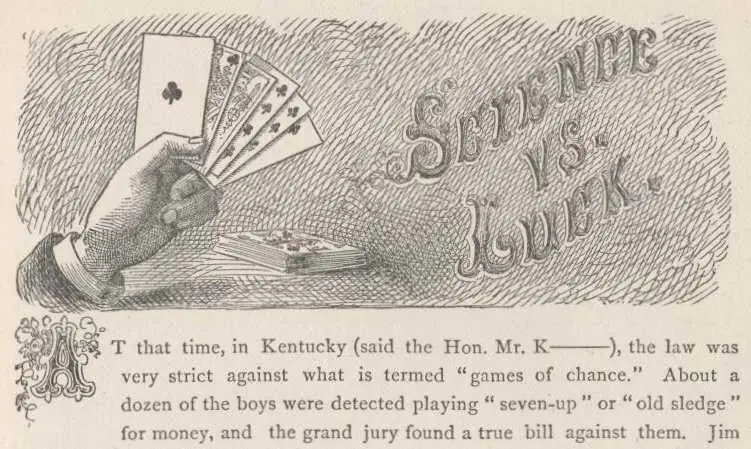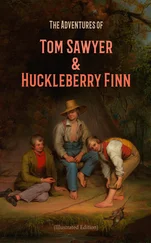Riley is very methodical, untiringly accommodating, never forgets anything that is to be attended to, is a good son, a stanch friend, and a permanent reliable enemy. He will put himself to any amount of trouble to oblige a body, and therefore always has his hands full of things to be done for the helpless and the shiftless. And he knows how to do nearly everything, too. He is a man whose native benevolence is a well-spring that never goes dry. He stands always ready to help whoever needs help, as far as he is able—and not simply with his money, for that is a cheap and common charity, but with hand and brain, and fatigue of limb and sacrifice of time. This sort of men is rare.
Riley has a ready wit, a quickness and aptness at selecting and applying quotations, and a countenance that is as solemn and as blank as the back side of a tombstone when he is delivering a particularly exasperating joke. One night a negro woman was burned to death in a house next door to us, and Riley said that our landlady would be oppressively emotional at breakfast, because she generally made use of such opportunities as offered, being of a morbidly sentimental turn, and so we should find it best to let her talk along and say nothing back—it was the only way to keep her tears out of the gravy. Riley said there never was a funeral in the neighborhood but that the gravy was watery for a week.
And, sure enough, at breakfast the landlady was down in the very sloughs of woe—entirely brokenhearted. Everything she looked at reminded her of that poor old negro woman, and so the buckwheat cakes made her sob, the coffee forced a groan, and when the beefsteak came on she fetched a wail that made our hair rise. Then she got to talking about deceased, and kept up a steady drizzle till both of us were soaked through and through. Presently she took a fresh breath and said, with a world of sobs:
"Ah, to think of it, only to think of it!—the poor old faithful creature. For she was so faithful. Would you believe it, she had been a servant in that selfsame house and that selfsame family for twenty seven years come Christmas, and never a cross word and never a lick! And, oh, to think she should meet such a death at last!—a-sitting over the red hot stove at three o'clock in the morning and went to sleep and fell on it and was actually roasted! Not just frizzled up a bit, but literally roasted to a crisp! Poor faithful creature, how she was cooked! I am but a poor woman, but even if I have to scrimp to do it, I will put up a tombstone over that lone sufferer's grave—and Mr. Riley if you would have the goodness to think up a little epitaph to put on it which would sort of describe the awful way in which she met her—"
"Put it, 'Well done, good and faithful servant,'" said Riley, and never smiled.
Table of Contents
John Wagner, the oldest man in Buffalo—one hundred and four years old—recently walked a mile and a half in two weeks.
He is as cheerful and bright as any of these other old men that charge around so persistently and tiresomely in the newspapers, and in every way as remarkable.
Last November he walked five blocks in a rainstorm, without any shelter but an umbrella, and cast his vote for Grant, remarking that he had voted for forty-seven presidents—which was a lie.
His "second crop" of rich brown hair arrived from New York yesterday, and he has a new set of teeth coming from—Philadelphia.
He is to be married next week to a girl one hundred and two years old, who still takes in washing.
They have been engaged eighty years, but their parents persistently refused their consent until three days ago.
John Wagner is two years older than the Rhode Island veteran, and yet has never tasted a drop of liquor in his life—unless—unless you count whisky.
Table of Contents

At that time, in Kentucky (said the Hon. Mr. K——-); the law was very strict against what is termed "games of chance." About a dozen of the boys were detected playing "seven up" or "old sledge" for money, and the grand jury found a true bill against them. Jim Sturgis was retained to defend them when the case came up, of course. The more he studied over the matter, and looked into the evidence, the plainer it was that he must lose a case at last—there was no getting around that painful fact. Those boys had certainly been betting money on a game of chance. Even public sympathy was roused in behalf of Sturgis. People said it was a pity to see him mar his successful career with a big prominent case like this, which must go against him.
But after several restless nights an inspired idea flashed upon Sturgis, and he sprang out of bed delighted. He thought he saw his way through. The next day he whispered around a little among his clients and a few friends, and then when the case came up in court he acknowledged the seven-up and the betting, and, as his sole defense, had the astounding effrontery to put in the plea that old sledge was not a game of chance! There was the broadest sort of a smile all over the faces of that sophisticated audience. The judge smiled with the rest. But Sturgis maintained a countenance whose earnestness was even severe. The opposite counsel tried to ridicule him out of his position, and did not succeed. The judge jested in a ponderous judicial way about the thing, but did not move him. The matter was becoming grave. The judge lost a little of his patience, and said the joke had gone far enough. Jim Sturgis said he knew of no joke in the matter—his clients could not be punished for indulging in what some people chose to consider a game of chance until it was proven that it was a game of chance. Judge and counsel said that would be an easy matter, and forthwith called Deacons Job, Peters, Burke, and Johnson, and Dominies Wirt and Miggles, to testify; and they unanimously and with strong feeling put down the legal quibble of Sturgis by pronouncing that old sledge was a game of chance.
"What do you call it now?" said the judge.
"I call it a game of science!" retorted Sturgis; "and I'll prove it, too!"
They saw his little game.
He brought in a cloud of witnesses, and produced an overwhelming mass of testimony, to show that old sledge was not a game of chance but a game of science.
Instead of being the simplest case in the world, it had somehow turned out to be an excessively knotty one. The judge scratched his head over it awhile, and said there was no way of coming to a determination, because just as many men could be brought into court who would testify on one side as could be found to testify on the other. But he said he was willing to do the fair thing by all parties, and would act upon any suggestion Mr. Sturgis would make for the solution of the difficulty.
Mr. Sturgis was on his feet in a second.
"Impanel a jury of six of each, Luck versus Science. Give them candles and a couple of decks of cards. Send them into the jury-room, and just abide by the result!"
There was no disputing the fairness of the proposition. The four deacons and the two dominies were sworn in as the "chance" jurymen, and six inveterate old seven-up professors were chosen to represent the "science" side of the issue. They retired to the jury-room.
In about two hours Deacon Peters sent into court to borrow three dollars from a friend. (Sensation.) In about two hours more Dominie Miggles sent into court to borrow a "stake" from a friend. (Sensation.) During the next three or four hours the other dominie and the other deacons sent into court for small loans. And still the packed audience waited, for it was a prodigious occasion in Bull's Corners, and one in which every father of a family was necessarily interested.
Читать дальше













